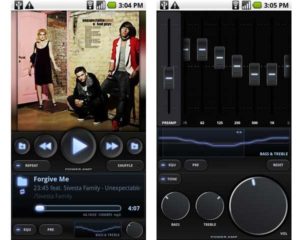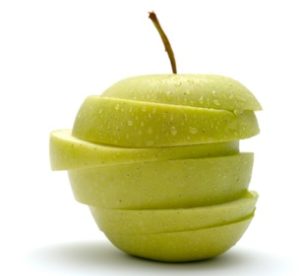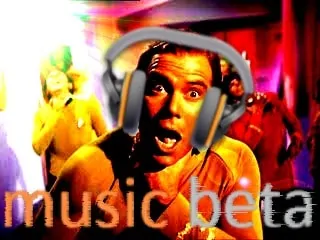Ten Reasons Google Music Beta Bit the Big One

So despite not getting the labels signed, Google indeed made a music announcement, but the very name of the product, Google Music Beta, tells us that this is yet another placeholder app, and the real thing is Not Here Yet, or at least No Longer Here.
We’ve been waiting a year for Google to figure out how to make an Android phone have the one must-have app that Apple’s been providing from the beginning: the ability to play your music without getting a Ph.D. in User Interface Interpretation. Here’s all the reasons that Google Beta doesn’t even a merit a Gentleman’s C in the Report Card of Real Life.
 10. Hey, You, Get Off of My Cloud!
10. Hey, You, Get Off of My Cloud!
Google wasn’t first with a Cloud Music service. Amazon was with Amazon Cloud Player, and clearly they took everyone by surprise. First doesn’t always mean best, but first has a way of holding onto market share for a long time. And Google’s second place arrival didn’t necessarily mean they tried harder.
Face it, if you aren’t first, you have to be better. Music Beta isn’t either.
9. To Market, To Market, to Buy some Hot Tunes?
No Google Music tracks for sale? That means the only way to get your music in the Cloud is to upload it. Large music collections take days and days to upload. And this is a shame.
What Google had really planned for its Music offering would probably have been sweet. (Googlers mention that features they can’t tell me about were dropped from the service as they tested it internally.) Again, from Billboard, Google wanted to let users scan the bar code off the CD and access a master copy of the tracks in the cloud, rather than upload multiple copies of the same music. We’ll discuss the missing functionality (as opposed to the complete absence of Music in the Market) more in #8 and #5.
8. The Upload That Took a Thousand Hours

Meanwhile, Apple’s Lala acquisition is going to enable Scan and Match to make the whole encloudification process amazing. You already bought that song? Okay, it’s here for you to play, no need to upload. Ah, the joy of licensing. It was Scan and Match that Google wanted to implement as well (see #9), but without cooperation from the music copyright owners, that wasn’t going to succeed.
You know what’s really galling? Remember that Project Tungsten demo they showed at the first day Google I/O 2011 Keynote? That was where the CD taps the box and you hear a chime saying the music content had loaded; a second tap started playing the music. Maybe the music industry hasn’t implemented NFC chips in their CD cases yet, but there’s no technological reason why Google can’t Scan and Match the bits of our digitized music collections.
7. The Not-So-Little Record Labels That Wouldn’t

Meanwhile, Apple has been negotiating with the labels as well, and has already come to an agreement with three of the four major labels: Sony, EMI and Warner. These are #2, #3 and #4. And why not? Apple already had a relationship with the music industry. iTunes pretty much saved their bacon.
Why was Google waiting until everyone was on board? Why not launch the service with two of the labels and some music available? And for that matter, why doesn’t Google simply do the most expedient thing possible and buy some labels outright, particularly as Warner Music was up for sale earlier this month? Of course Google can afford a few billion for acquisitions! (Yeah, there’s probably some Senate Committee just waiting for them to try something like that. )
6. There’s an App for That

PowerAmp has gotten consistently great reviews. Why didn’t the Google Music team look at what Power Amp could do when designing their own product? Heck, why didn’t they just buy PowerAmp?
Let’s hope that the reason Music Beta seems so unready for prime time is that Google had to yank the cool stuff out when the licensing deals weren’t flying. That wouldn’t explain why they couldn’t throw in an equalizer, though!
5. Speed Bumps on the Upload Road

This idea could have saved Google a lot of time and space themselves, except the music labels probably would have screamed bloody murder if they figured out that was how Google was going to implement their Cloud Music Server. It wouldn’t surprise me in the least if that’s indeed what Google originally did, and it also wouldn’t surprise me if they refused to explain just how they did it, what with Sony, Universal, Warner and EMI ready to dispatch lawyers by the trainload.
So that’s why your upload is taking a thousand hours. They learned a thing from the DropBox situation and they’re pretending to upload Hotel California a hundred million times.
Meanwhile, another music player app for iOS called BoxyTunes is… using your DropBox as a music cloud storage area, and guess what? It isn’t taking long to upload your collection because most of it’s probably already on somebody’s DropBox somewhere.
4. Fragmentation. Again.
Ruh-roh. Google Music Beta requires a minimum of Android OS 2.2 (Froyo). I see really ticked off DROID Eris owners.
3. Known Unknowns and Unknown Unknowns

- What happens when Google Music Beta grows up and becomes Google Music? How much will it cost? Will the cost be per song, per megabyte, per use? What restrictions will be put on use of the service? Will we have to pay to listen to music we already paid for? It’s difficult to fairly compare Music Beta to Amazon Cloud Player when the latter has announced some pricing and the former has not.
- While it’s still in Beta, how slowly or quickly will the invitations to Google Music Beta be given out? Will anyone outside the US be invited to try it? Is Google ever planning on launching the product worldwide? If you asked for an invitation are you still waiting or did you get one? A number were sent out exactly one week after the keynote announcement.
- We keep hearing Apple’s deals with all the labels is imminent (as of now they have signed with three out of the four), and they’ll be rolling out a Cloud service with Scan and Match that will clobber both Google and Amazon. But there’s another wrinkle in the negotiations, that affect all three firms: there’s recording rights, and then there’s publishing rights. Publishing rights make sure the owners of a song (as opposed to a recording of a song) are remunerated. We’re hearing a lot more about negotiations with the record labels (who own sound recording rights, but not the publishing rights to the songs themselves).
- Here’s an unknown I just learned: Did you know that currently you are limited to eight devices with Music Beta? iTunes has a similar device limit, so it isn’t that surprising, but it wasn’t announced in the keynote nor featured in my invitation.
2. A Lost Opportunity to Make Cupertino Applesauce

1. An iPhone is an iPod that can phone home

This isn’t a luxury feature, Google. This is a must-have. Between Apple’s phones and Apple’s deal, Google may have lost its best chance to slice Apple up, period.
What do you think of Google’s offering, and how it compares to what’s available or what’s supposedly coming? Did Google do the best they could, or is this just a wasted opportunity? Share your Google Music Beta thoughts in comments.


